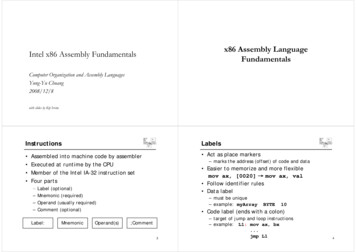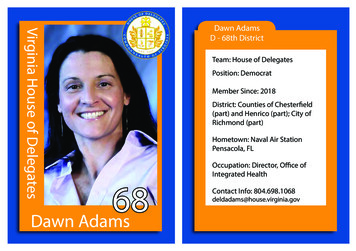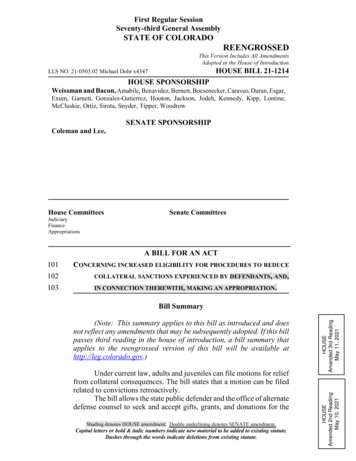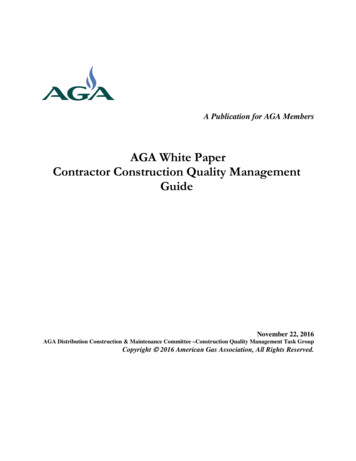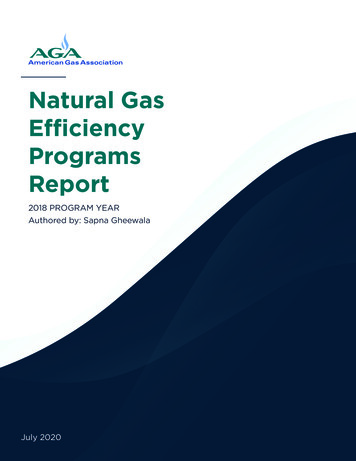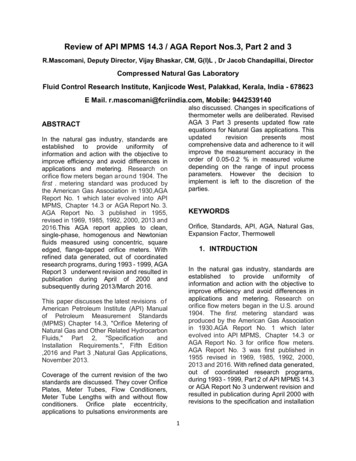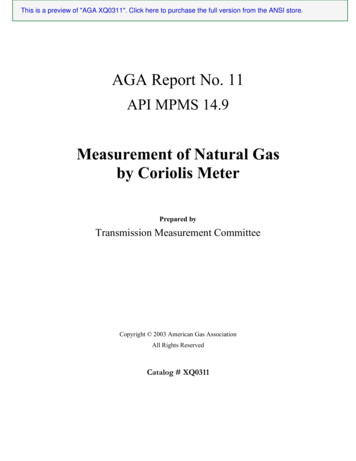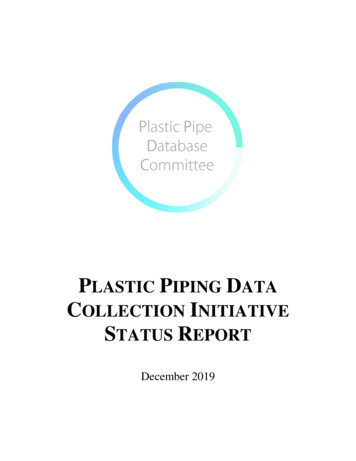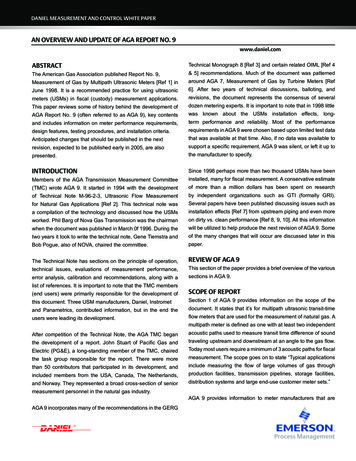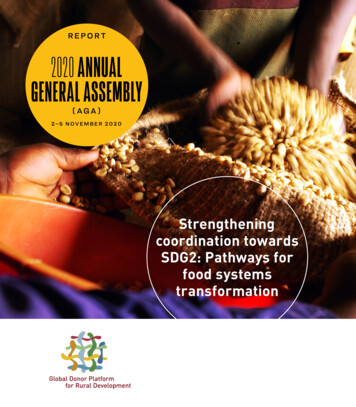
Transcription
REPORT2020 ANNUALGENERAL ASSEMBLY(AGA)2–5 NOVEMBER 2020Strengtheningcoordination towardsSDG2: Pathways forfood systemstransformation
ACKNOWLEDGEMENTSThe report of the 2020 Annual General Assembly of the Global Donor Platform forRural Development (GDPRD) was produced by the GDPRD Secretariat. The reportwas drafted by Hope Elisabeth Traficanti, Communications, Strategy and MarketingConsultant, under the guidance of Jim Woodhill, Director of AgriFoodNexus Consulting,and Honorary Research Associate; and Maurizio Navarra, Acting Coordinator of theSecretariat of the GDPRD.Sylvia Otieno and Roberta Croce, Interns at the Secretariat, provided invaluableresearch support. The report was graphically designed and laid out by Andrea Wöhr,Graphic Design Consultant, and edited thanks to the support of the CommunicationsDivision of the International Fund for Agricultural Development.The designations employed and the presentation of material in this publication do not imply the expression ofany opinion whatsoever on the part of the International Fund for Agricultural Development of the United Nationsconcerning the legal status of any country, territory, city or area or of its authorities, or concerning the delimitationof its frontiers or boundaries. The designations “developed” and “developing” economies are intended for statisticalconvenience and do not necessarily express a judgement about the stage reached by a particular country or areain the development process. This publication or any part thereof may be reproduced without prior permissionfrom IFAD, provided that the publication or extract therefrom reproduced is attributed to IFAD and the title of thispublication is stated in any publication and that a copy thereof is sent to IFAD. 2021 Secretariat of the Global Donor Platform for Rural Development, hosted by IFADCover: IFAD/Mwanzo Millinga
TABLE OF CONTENTSBACKGROUND 4HIGHLIGHTS 6High-level session: Transforming food systems: Implications for coordinationand financing 6Session 2: Pathways for food systems transformation 16Session 3: Food systems: Data for evidenced-based policymaking 19Session 4: Catalysing responsible private sector investments for foodsystems transformation 233KEY ISSUES 28Issue 1: Coordination and alignment of actors 28Issue 2: Catalysing and de-risking financing 29Issue 3: Supporting policy innovation 30Issue 4: Brokering value chain innovation 32Issue 5: Building the knowledge base and capacity 33Issue 6: Using data for decision-making 34Issue 7: Promoting responsible private-sector investments in food systems 352 0 2 0 A N N U A L G E N E R A L A S S E M B L Y ( A G A ) R E P O R T
BACKGROUNDThe Global Donor Platform forRural Development (GDPRD) is anetwork of 40 bilateral and multilateraldonors, international financial institutionsand foundations with a common vision of theimportant role that agriculture, food systemsand rural development play in combating hungerand poverty and achieving the 2030 Agenda forSustainable Development. Formed in 2003, theGDPRD convenes donors and other stakeholdersacross sectors to promote coordinated publicand private investments in agricultureand rural development.The Annual General Assembly (AGA) of the Global DonorPlatform for Rural Development (GDPRD) provides an openforum for dialogue among members, partners and guests oncritical issues and emerging trends that affect the lives ofrural people.In preparation for the Food Systems Summit (FSS)in 2021, the 2020 AGA, held from 2 to 5 November 2020,focused on the theme “Strengthening Coordination towardsSDG2”. Speakers and participants discussed the processesneeded at the local, national, regional and global levels to spurfood systems transformation – and the role donors can play incatalysing change.Because of the COVID-19 pandemic, the2020 AGA was held virtually. ThisFood Systems Summitreport summarizes the key outputsIn 2021, the Secretary-General of the Unitedof these discussions, whichNations will convene the Food Systems Summitwill be used by the GDPRD(FSS) – a platform to launch bold new actions to transformto develop its input for thehow we produce, consume and think about food, deliveringupcoming FSS.progress on all 17 Sustainable Development Goals. The FSS is foreveryone everywhere – a people’s summit – focused on concretesolutions that mobilize all players, from producers to consumers, to takeaction in transforming the world’s food systems.Bringing together key players from science, business, policy, health careand academia, with farmers, indigenous peoples, youth organizations,consumer groups, environmental activists, and other key stakeholders,the FSS is focused on generating solutions along five interdependentAction Tracks: (1) Ensure access to safe and nutritious foodfor all; (2) Shift to sustainable consumption patterns;(3) Boost nature-positive production; (4) Advanceequitable livelihoods; and (5) Build resilience tovulnerabilities, shocks and stress.42 0 2 0 A N N U A L G E N E R A L A S S E M B L Y ( A G A ) R E P O R TThe AGA concept note andagenda are available here.Full profiles of the speakersare available here.
BACKGROUNDThe AGA comprised four sessions:2 NOVEMBER 2020: HIGH-LEVEL EVENTTransforming food systems: implications forcoordination and financingUnderstanding the processes, coordination and financing needed forfood systems transformation to be sustainable, equitable and resilient.HIGH-LEVELSESSION3 NOVEMBER 2020: INTER ACTIVE SESSIONPathways for food systems transformationShaping the GDPRD’s contribution to the FSS.SESSION 24 N OV E M B E R 2 0 2 0: PA N E L D I S C U S S I O NFood systems: data for evidence-based policymakingRaising awareness and building capacity for using data to supportagricultural policymaking.SESSION 35 N OV E M B E R 2 0 2 0: PA N E L D I S C U S S I O NCatalysing responsible private-sector investmentsfor food systems transformationSESSION 4 IFAD/Mwanzo MillingaExploring how donor support can mobilize private investmentfor food systems transformation.52 0 2 0 A N N U A L G E N E R A L A S S E M B L Y ( A G A ) R E P O R T
HIGHLIGHTSHIGH-LEVELSESSIONTransforming food systems: Implicationsfor coordination and financingModerator:Jim Woodhill,Director, AgriFoodNexus Consulting, and Honorary Research Associate,Environmental Change Institute, University of OxfordOpening remarks:Paul van de Logt ,Agnes Kalibata,Head, Food and NutritionSecurity, Netherlands, andCo‑Chair, Global Donor Platformfor Rural DevelopmentSpecial Envoy of the SecretaryGeneral of the United Nations onthe Food Systems SummitMichelle Nunn,Marie Haga,President and CEO, CARE USAAssociate Vice-President,External Relations and GovernanceDepartment, International Fund forAgricultural Development (IFAD)Hanneke Faber,Hamady Diop,President, Foods &Refreshment,UnileverHead of Natural ResourcesGovernance, Food Security andNutrition, New Partnership forAfrica’s DevelopmentCarla Montesi,Johan Swinnen,Director, Planet and Prosperity(DEVCO.C), Directorate-Generalfor International Cooperationand Development, EuropeanCommissionDirector-General, InternationalFood Policy Research InstituteJoan Valadou,Martien van Nieuwkoop,Head, Human DevelopmentDepartment, Ministry for Europeand Foreign Affairs, FranceGlobal Director, Agriculture andFood Global Practice, World BankPanellists:62 0 2 0 A N N U A L G E N E R A L A S S E M B L Y ( A G A ) R E P O R T
HIGHLIGHTSThe high-level event introduced the upcoming FSS, raised key issues relatedto the Action Tracks, and explored their implications for donors.Key messages that arose from the discussion are summarized below.T O W A R D S T H E S U S TA I N A B L E D E V E L O P M E N T G O A L S :MAKING UP LOST GROUNDLaunched in 2015, the 2030 Agenda for Sustainable Development setambitious targets. Even before the COVID-19 pandemic, there were seriousconcerns about whether the Sustainable Development Goals (SDGs) –especially SDG 2 (zero hunger) – couldEnding extreme poverty and hungerbe reached by 2030. Critical indicators ofand recovering from COVID-19progress are significantly off track, leavingrequire more investment and innovativemillions of vulnerable people at risk ofapproaches. With the right policycontinuing hunger, food insecurity and poverty.and funding, we can tackle this as aTransforming food systems is key to achievingglobal community.the SDGs, ensuring long-term prosperity andMarie Haga, IFADprotecting our planet.“”T H E F O O D S Y S T E M S S U M M I T: A C R I T I C A L O P P O R T U N I T YThe FSS will provide a platform for engaging all stakeholders and achievingconsensus on an action agenda for change. There is a recognized need torethink the way food is consumed and produced, and move from discussion of“what” needs to be done to practical strategies for “how” to make it happen.“This Summit is a major globalmilestone in moving to sustainablefood systems and we are ready to engagein all the Action Tracks to achieve reallyambitious outcomes.”Carla Montesi, EU72 0 2 0 A N N U A L G E N E R A L A S S E M B L Y ( A G A ) R E P O R T“In a nutshell, this Summit needs to beabout building consensus, engagingpeople, and coming up with ambitioussolutions that will help us find a new pathforward.”Agnes Kalibata, FSS
HIGHLIGHTST O W A R D S S U S TA I N A B L E F O O D S Y S T E M S :“Women are just oneof the vulnerablegroups whose livelihoodsare impacted by inequity infood systems. Youth andindigenous peoples alsoface significant barriers,and we will need to bevigilant to ensure theirinclusion. As we worktowards next year’s FoodSystems Summit, we willbuild solutions to tacklethese roadblocks together.”Michelle Nunn, CARE USAA T R A N S F O R M AT I V E A P P R O A C HThe food systems approach signals the shift towards a more integrated way ofthinking about food that crosses sectors and moves beyond business as usual.This paradigm shift requires fundamental advances in policy and financing,cross-sector knowledge-sharing and high-levelWe are not just looking at foodcoordination. It also requires breaking down thesecurity, we are looking at resilience,barriers between humanitarian and developmentwearelooking at access to markets,financing, plant, animal and ecosystem health,we are looking at nutrition, we areand public- and private-sector investment.looking at policy That is where theIt includes all voices and interests, especiallyissue of alignment really needs to besmallholder farmers, youth, women and otherstrengthened.groups who are often marginalized – ensuringHamady Diop, NEPADthat no one is left behind.“”“The concept of systems thinking is really well accepted,which means technology has to be accompaniedby policy and vice-versa They have to go together,and reinforce each other, particularly from a value chainperspective. I see that as the heart of the solution.”Johan Swinnen, IFPRIR O L E O F T H E D O N O R C O M M U N I T Y : C ATA LY S I N G A C T I O N ,“The donor communityhas a catalytic rolein helping understand thepathways to transformfood systems. For example,through supportinginnovation and new ideas,helping different actorscoordinate, creatingconditions for responsibleprivate sector investments,contributing to governmentprogrammes and reducingrisk.”I N V E S T M E N T A N D C O O R D I N AT I O NDonor investments can be critical for enabling and incentivizing other actorsto play their part. However, global donor investments in food systems arerelatively small compared to the resources mobilized by farmers, foodsector businesses and national governments. Therefore, it is vital that donorinvestments be used in the most catalytic way possible. In moving towardsthe FSS, and following it up with actions,Putting your support behind athe donor community needs to engagesector-wide approach rather thanwith all actors to review how resources canhaving stand-alone projects will providebest be allocated to support food systemsa platform for donors to work moretransformation.Marie Haga, IFAD82 0 2 0 A N N U A L G E N E R A L A S S E M B L Y ( A G A ) R E P O R T“effectively together, so you can achievesynergies between the donor support ineach particular country.”Martien van Nieuwkoop, WB
HIGHLIGHTSMUTUAL LE ARNING AND SHARING AMONG“We need to documentgood practices sothat they can be sharedand contextualized, to helpsmallholder farmers to learnfrom each other, or to learnfrom region to region. Wealso need to facilitate selfdiagnosis at the nationaland regional levels sothat people can developstrategies that arecontext-specific.”Hamady Diop, NEPADD I V E R S E S TA K E H O L D E R SThere is no “silver bullet” solution for feeding the world sustainably. Totransform food systems in the short time frame required to meet the SDGs,actors need to learn and innovate rapidly. From across the food system andrural spaces, diverse stakeholder groups need to come to the table, exchangeideas and create synergies. The challenges are too great to exclude anyonefrom the table. Through the food systems approach, stakeholders fromagriculture, environment, nutrition and business can share their uniqueknowledge to bridge this immense gap.“Alignment with partner countries’ strategies andpolicies is key in order to be efficient and strengthenpartner countries’ institutions, especially local authorities For us, this is really critical to ensure the sustainability ofour investment results.”Joan Valadou, Ministry for Europe andForeign Affairs, FranceO P T I M I Z I N G T H E P O T E N T I A L O F I N F O R M AT I O N A N DC O M M U N I C AT I O N S T E C H N O L O G YDigital technology has huge potential to provide services to poor andvulnerable groups, and to generate data and evidence for decision-making.Smallholder farmers can benefit from information and communicationstechnology through greater access to financial services, market information,technical advice, weather information, sharedmachinery use, and collective marketing. BigThere is a whole varie
8 2020 ANNUAL GENERAL ASSEMBLY (AGA)REORT HIGH LI GHTS TOWARDS SUSTAINABLE FOOD SYSTEMS: A TRANSFORMATIVE APPROACH The food systems approach signals the shift towards a more integrated way of thinking about food that crosses sectors and moves beyond business as usual. This paradigm shift requires fundamental advances in policy and financing, cross-sector
